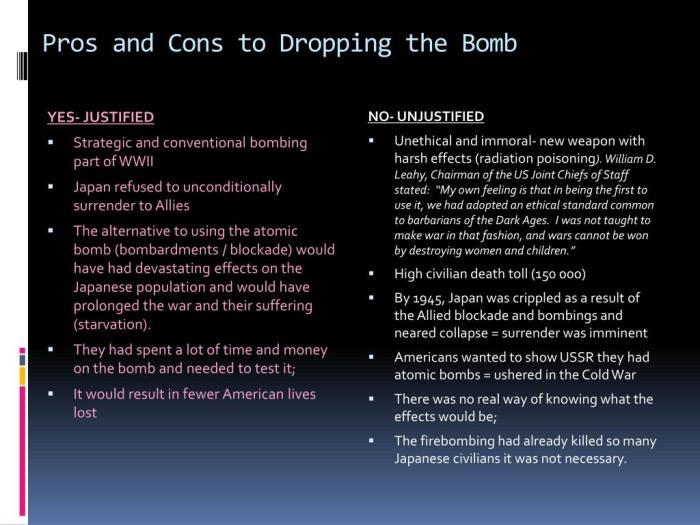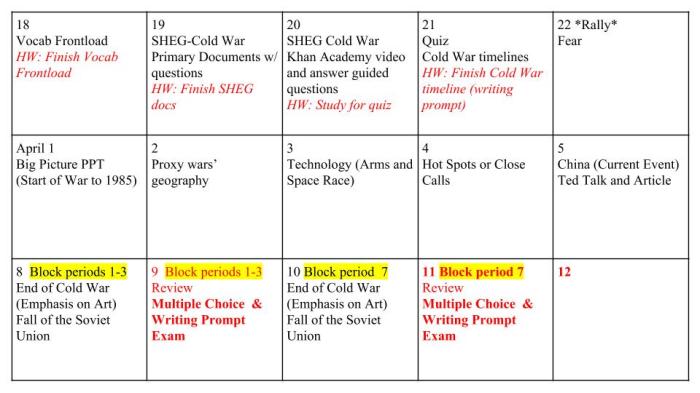Dropping the atomic bomb pros and cons is a complex and controversial topic that has been debated for decades. In this essay, we will explore the arguments for and against the use of atomic bombs in World War II, examining the historical context, ethical implications, and long-term consequences of this momentous decision.
The decision to drop the atomic bombs on Hiroshima and Nagasaki remains one of the most consequential in human history. It is a decision that continues to be debated today, with no easy answers.
Background of Atomic Bomb Development

The development of the atomic bomb was a culmination of scientific advancements and historical events. In the early 20th century, physicists made significant discoveries about the structure of the atom and the potential for releasing vast amounts of energy through nuclear reactions.
The rise of Nazi Germany and the threat of war spurred research into developing nuclear weapons as a potential deterrent.
In 1942, the United States launched the Manhattan Project, a top-secret research and development program to build an atomic bomb. Led by scientists such as J. Robert Oppenheimer, Enrico Fermi, and Leo Szilard, the project brought together thousands of scientists and engineers to develop and test the first nuclear weapons.
Hiroshima and Nagasaki Bombings
On August 6, 1945, the United States dropped an atomic bomb on the Japanese city of Hiroshima. The bomb, codenamed “Little Boy,” exploded with the force of 15,000 tons of TNT, killing an estimated 140,000 people and leveling much of the city.
Three days later, on August 9, 1945, the United States dropped a second atomic bomb on the city of Nagasaki. The bomb, codenamed “Fat Man,” was even more powerful than the Hiroshima bomb, killing an estimated 80,000 people and causing widespread devastation.
Arguments for Dropping the Bomb
Proponents of dropping the atomic bombs argued that it would end the war quickly and save lives. They believed that a protracted land invasion of Japan would have resulted in heavy casualties on both sides. Additionally, they hoped that the shock and awe of the atomic bombs would break Japanese morale and force a surrender.
Some argued that the use of the atomic bombs was justified because Japan had committed atrocities during the war, such as the Rape of Nanking and the Bataan Death March.
Arguments Against Dropping the Bomb, Dropping the atomic bomb pros and cons
Opponents of dropping the atomic bombs argued that the massive civilian casualties and the long-term health effects of radiation were unacceptable. They believed that the United States could have achieved victory through other means, such as a naval blockade or a diplomatic solution.
Others argued that the use of nuclear weapons was unethical and would set a dangerous precedent for future warfare.
FAQ: Dropping The Atomic Bomb Pros And Cons
What were the arguments for dropping the atomic bomb?
The main arguments for dropping the atomic bomb were that it would end the war quickly and save lives. Proponents of the bomb argued that a land invasion of Japan would have resulted in even greater casualties.
What were the arguments against dropping the atomic bomb?
The main arguments against dropping the atomic bomb were the massive civilian casualties and the long-term health effects of radiation. Critics of the bomb also argued that it was an unethical weapon that violated the laws of war.
What were the consequences of dropping the atomic bomb?
The atomic bombings of Hiroshima and Nagasaki resulted in the deaths of hundreds of thousands of people. The bombings also had a profound impact on Japanese society and international relations. The bombings led to the end of World War II, but they also raised serious questions about the use of nuclear weapons.



